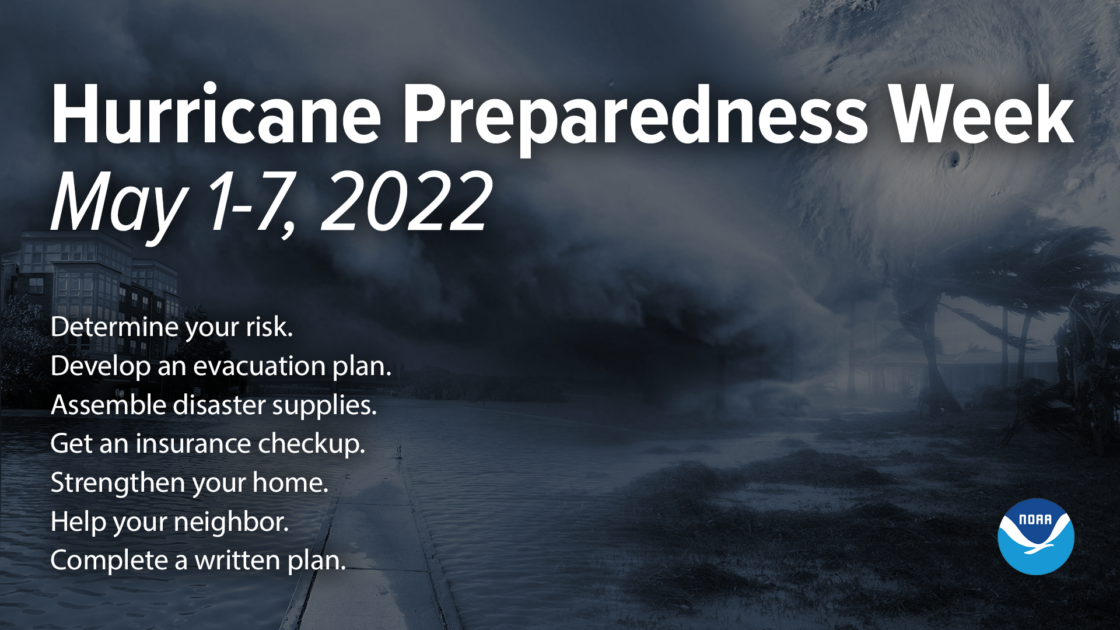It’s National Hurricane Preparedness Week! Hurricane Season in the Atlantic Basin runs from June 1 to November 30 each year. Check out these great tips from the National Weather Service to help you determine your personal hurricane risk, find out if you live in a hurricane evacuation zone, review/update insurance policies, prepare your home and/or business, gather emergency supplies and create a plan.
Hurricanes are among nature’s most powerful and destructive phenomena. According to the Federal Emergency Management Agency (FEMA), hurricanes have caused eight of the ten costliest disasters ever in U.S. According to the National Oceanic and Atmospheric Administration (NOAA), a normal Atlantic hurricane season produces 14 named storms, of which seven become hurricanes, including three major hurricanes. This year, reports anticipate higher than normal activity, including 19 named storms, of which nine are forecast to become hurricanes, and four are predicted to strengthen into major hurricanes.
1. Determine Your Risk
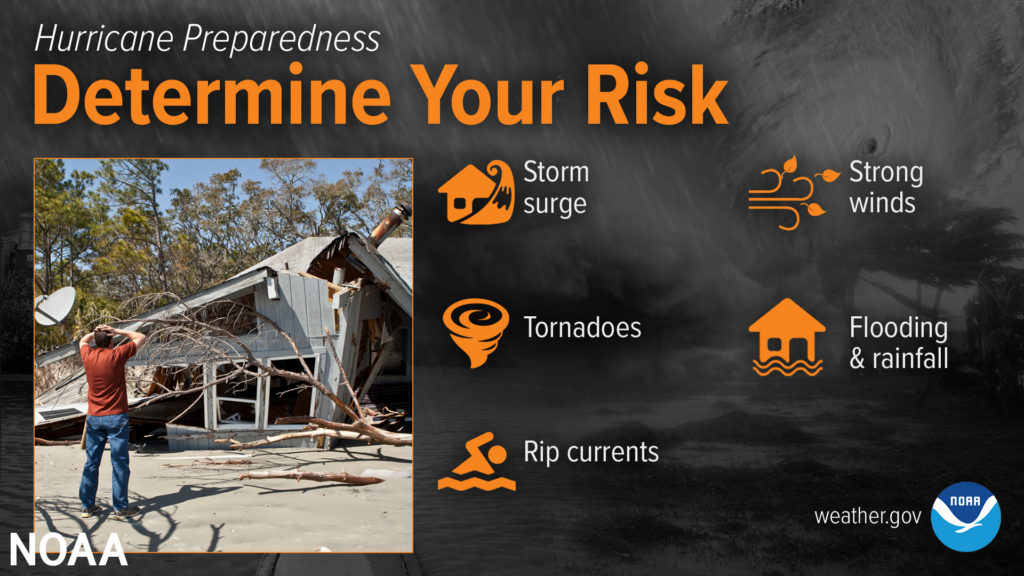 The threats from hurricanes to you and your family can vary widely depending on where you live. It’s not just those along the coast that can experience significant, life-threatening impacts. Evaluate what you need to do to protect your home and family now, before the first storm of the season even forms.
The threats from hurricanes to you and your family can vary widely depending on where you live. It’s not just those along the coast that can experience significant, life-threatening impacts. Evaluate what you need to do to protect your home and family now, before the first storm of the season even forms.
2. Develop An Evacuation Plan
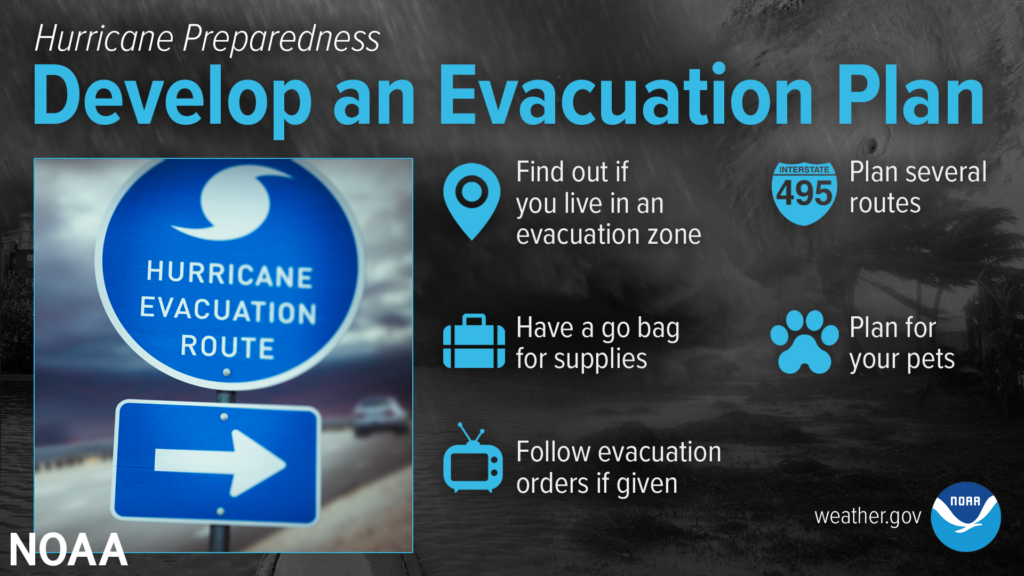 Take some time to create or edit your hurricane evacuation plan. The first thing you need to do is find out if you live in a storm surge hurricane evacuation zone or if you’re in a home that would be unsafe during a hurricane. If you are, figure out where you’d go and how you’d get there if told to evacuate. You do not need to travel hundreds of miles. Identify someone, perhaps a friend or relative who doesn’t live in an evacuation zone or unsafe home, and coordinate with them to use their home as your evacuation destination. Be sure to account for your pets, as most local shelters do not permit them. Put the plan in writing and/or type it up and save it online and back it up on the cloud.
Take some time to create or edit your hurricane evacuation plan. The first thing you need to do is find out if you live in a storm surge hurricane evacuation zone or if you’re in a home that would be unsafe during a hurricane. If you are, figure out where you’d go and how you’d get there if told to evacuate. You do not need to travel hundreds of miles. Identify someone, perhaps a friend or relative who doesn’t live in an evacuation zone or unsafe home, and coordinate with them to use their home as your evacuation destination. Be sure to account for your pets, as most local shelters do not permit them. Put the plan in writing and/or type it up and save it online and back it up on the cloud.
3. Assemble Disaster Supplies
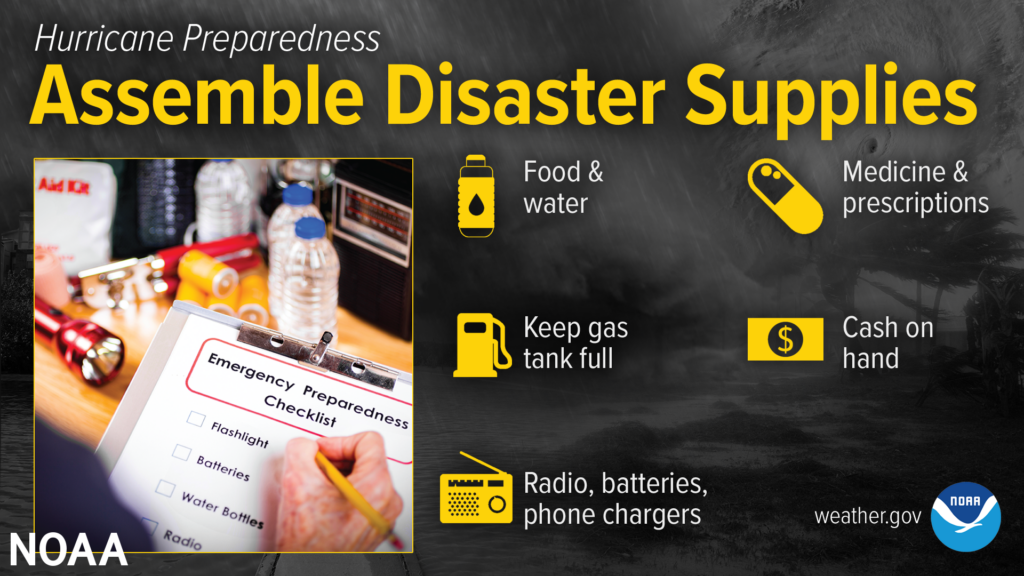 Whether you’re evacuating or sheltering-in-place, you’re going to need supplies not just to get through the storm but for the potentially lengthy and unpleasant aftermath. Have enough non-perishable food, water and medicine to last each person in your family a minimum of 3 days (store a longer than 3-day supply of water, if possible). Electricity and water could be out for at least that long. Don’t forget pet food. You’ll need extra cash, a battery-powered radio and flashlights. You may need a portable crank or solar-powered USB charger for your cell phones.
Whether you’re evacuating or sheltering-in-place, you’re going to need supplies not just to get through the storm but for the potentially lengthy and unpleasant aftermath. Have enough non-perishable food, water and medicine to last each person in your family a minimum of 3 days (store a longer than 3-day supply of water, if possible). Electricity and water could be out for at least that long. Don’t forget pet food. You’ll need extra cash, a battery-powered radio and flashlights. You may need a portable crank or solar-powered USB charger for your cell phones.
4. Review Your Insurance Policies
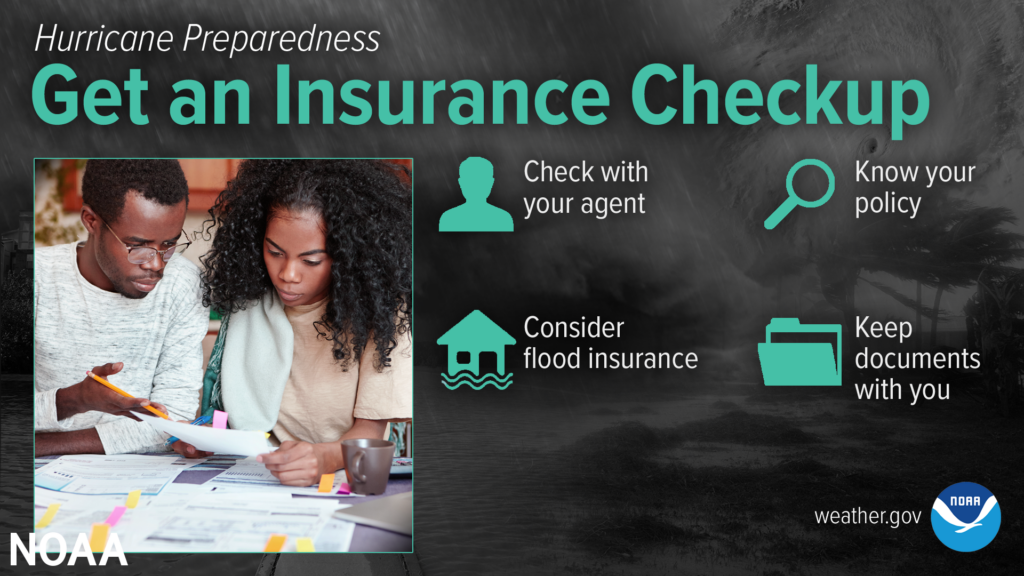 Call your insurance company or agent and ask for an insurance checkup to make sure you have enough insurance to repair or even replace your home and/or belongings. Remember, home and renters insurance doesn’t cover flooding, so you’ll need a separate policy for it. Flood insurance is available through your company, agent, or the National Flood Insurance Program at floodsmart.gov. Act now, as flood insurance requires a 30-day waiting period. Ensure that your insurance policies are printed and saved online and backed up on the cloud so they’re easily accessible when you need them. It’s also a good idea to create a Home Inventory List and/or Business Inventory List, and include your major belongings along with photographs in the instance you ever need to file a claim.
Call your insurance company or agent and ask for an insurance checkup to make sure you have enough insurance to repair or even replace your home and/or belongings. Remember, home and renters insurance doesn’t cover flooding, so you’ll need a separate policy for it. Flood insurance is available through your company, agent, or the National Flood Insurance Program at floodsmart.gov. Act now, as flood insurance requires a 30-day waiting period. Ensure that your insurance policies are printed and saved online and backed up on the cloud so they’re easily accessible when you need them. It’s also a good idea to create a Home Inventory List and/or Business Inventory List, and include your major belongings along with photographs in the instance you ever need to file a claim.
5. Strengthen Your Property
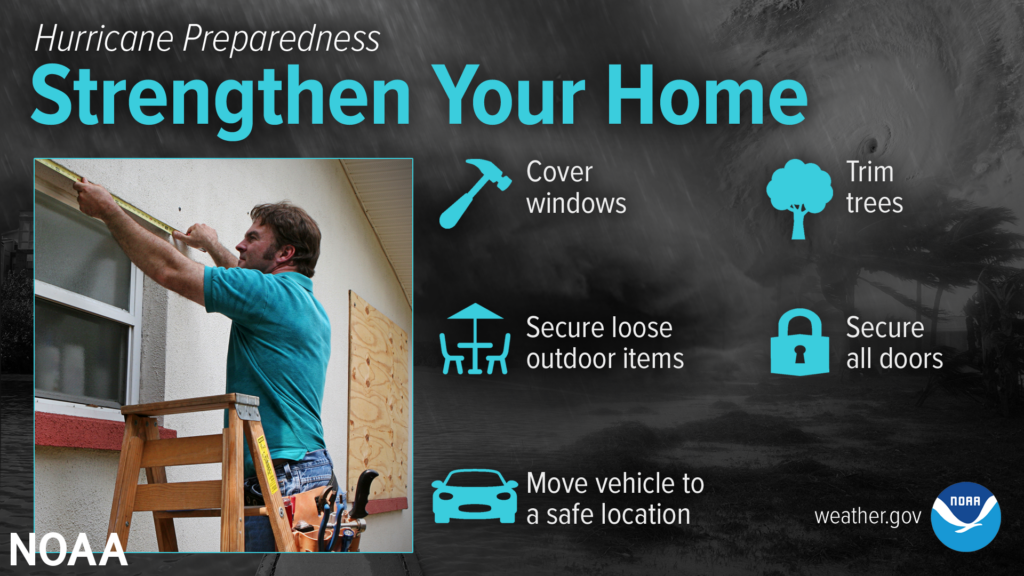 Whether you’re evacuating, or planning to ride out the storm in your home, make sure it is in good repair and up to local hurricane building code specifications to withstand wind impacts. Have the proper plywood, steel or aluminum panels to board up the windows and doors. Remember, the garage door is the most vulnerable part of the home, so it must be able to withstand the winds.
Whether you’re evacuating, or planning to ride out the storm in your home, make sure it is in good repair and up to local hurricane building code specifications to withstand wind impacts. Have the proper plywood, steel or aluminum panels to board up the windows and doors. Remember, the garage door is the most vulnerable part of the home, so it must be able to withstand the winds.
6. Help Your Neighbor
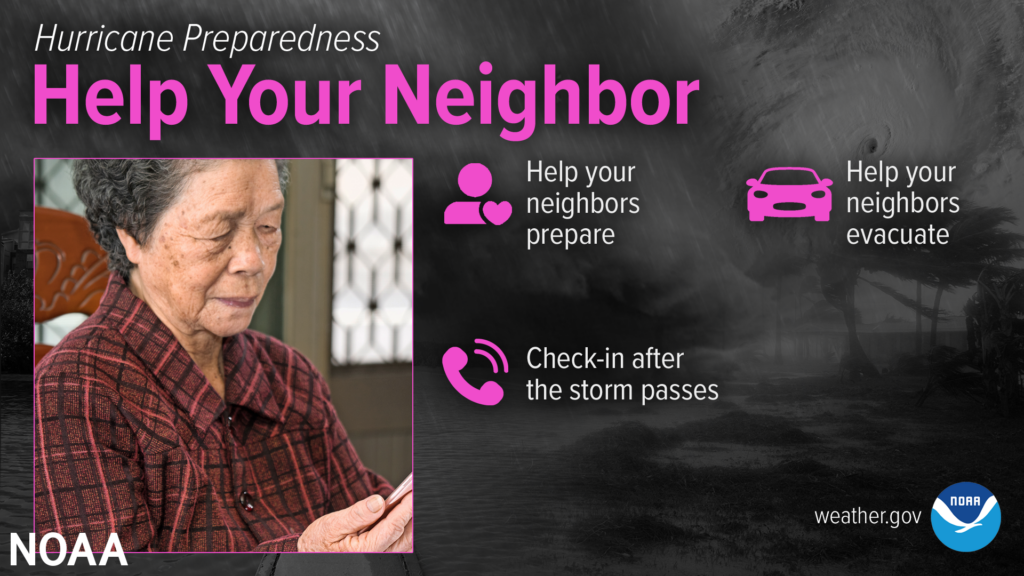 Many people rely on their neighbors before and after a disaster, and there are many ways you can help them. Learn about all the different actions you can take to prepare and recover from the hazards associated with hurricanes. Start the conversation now with these Neighbor Helping Neighbor strategies.
Many people rely on their neighbors before and after a disaster, and there are many ways you can help them. Learn about all the different actions you can take to prepare and recover from the hazards associated with hurricanes. Start the conversation now with these Neighbor Helping Neighbor strategies.
7. Complete Your Written Plan & Business Continuity Plan
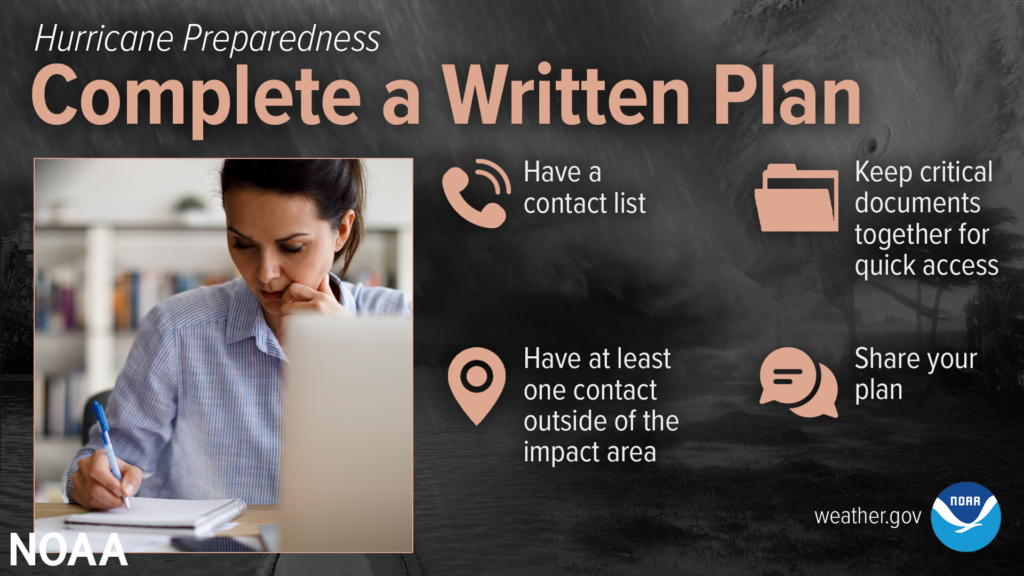 The time to prepare for a hurricane is now, before the season begins on June 1. Having a written plan will take the guesswork out of what you need to do to protect you, your family, your business, and your property. It’s important to be prepared. And by written, we mean typed, backed up on the cloud, and emailed to your family, friends and/or business team members that need to be informed. According to the Federal Emergency Management Agency (FEMA), if a business doesn’t have a Business Continuity Plan in place, 40% of small businesses won’t reopen after a storm event, 25% of businesses will close within one year, and 75% of businesses without a Continuity Plan will fail. Don’t be a statistic! It is important to have a Business Continuity Plan for your company and even more important that everyone understands it and you have strategies in place in the event of a storm. A Business Continuity Plan includes employee communication protocols, data, computer network, server, IT, infrastructure, and backup support should your business be affected by a hurricane, storm surge, damaging winds, flood and/or power outage. If you don’t have one yet, delegate a team to create your Business Continuity Plan, communicate it with your employees, and ensure that your business operations can continue and everyone stays safe and informed in the event of a storm. Maintaining business continuity is important. For more information, check out FEMA’s Ready Business Hurricane Toolkit.
The time to prepare for a hurricane is now, before the season begins on June 1. Having a written plan will take the guesswork out of what you need to do to protect you, your family, your business, and your property. It’s important to be prepared. And by written, we mean typed, backed up on the cloud, and emailed to your family, friends and/or business team members that need to be informed. According to the Federal Emergency Management Agency (FEMA), if a business doesn’t have a Business Continuity Plan in place, 40% of small businesses won’t reopen after a storm event, 25% of businesses will close within one year, and 75% of businesses without a Continuity Plan will fail. Don’t be a statistic! It is important to have a Business Continuity Plan for your company and even more important that everyone understands it and you have strategies in place in the event of a storm. A Business Continuity Plan includes employee communication protocols, data, computer network, server, IT, infrastructure, and backup support should your business be affected by a hurricane, storm surge, damaging winds, flood and/or power outage. If you don’t have one yet, delegate a team to create your Business Continuity Plan, communicate it with your employees, and ensure that your business operations can continue and everyone stays safe and informed in the event of a storm. Maintaining business continuity is important. For more information, check out FEMA’s Ready Business Hurricane Toolkit.
Be Prepared.
At CJ Claim Services, we have definitely witnessed our share of hurricanes over the last 15 years. Our expert team has a diverse background in public adjusting, insurance adjusting, restoration and construction. We walk you through the process, every step of the way to ensure you get a fair settlement. Being prepared is one of the best things you can do to protect yourself, your family, your business and your property.
RESOURCES
- National Weather Service: Hurricane Preparedness Tips
- FEMA: National Flood Insurance Program
- FLASH: Find Your Evacuation Zone
- Insurance Information Institute: Facts + Statistics: Hurricanes
- Ready.Gov: Neighbors
- Ready.Gov: Emergency Preparedness Kit
- Ready.Gov: Make A Plan
- Ready.Gov: Business
- Ready.Gov: Business Emergency Preparedness Social Media Toolkit
